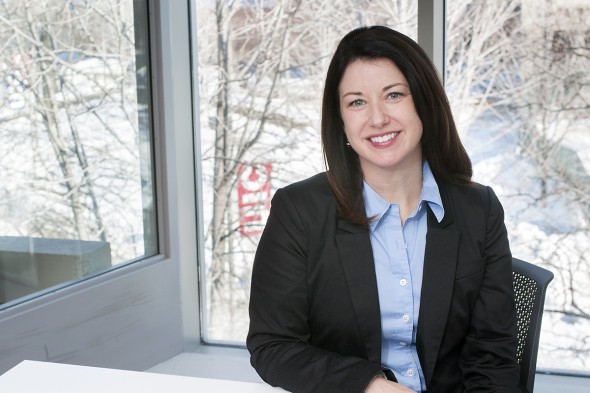Where are the female leaders in South Africa?

Jenny Hoobler examines why there aren’t more women in leadership positions in South Africa, a country with constitutional guarantees of gender equality. Photo: Joshua Clark
In South Africa, a country with constitutional guarantees of gender equity, why aren’t there more women leaders?
That’s the question that interests Jenny Hoobler, associate professor of management studies in the College of Business Administration.
It’s taken her to South Africa three times, starting with a 2011-12 sabbatical from UIC on a Fulbright research award, and most recently for two weeks over winter break.
On that visit she presented evidence from her research, done with UIC doctoral students Courtney Masterson and Eric Michel, at an African Academy of Management conference in neighboring Botswana.
When South Africa became a democratic nation in 1994, ending apartheid, prohibitions against gender discrimination were written into its constitution.
“They started ahead,” Hoobler said, meaning ahead of the United States.
“Still only 4 percent of U.S. CEOs are female, and women make 87 cents on the dollar that men make.
“So we don’t have it figured out here by any means.”
But in the case of South Africa, “what if a country starts out 100 miles down the road from us?,” she asked. “We’ve been trying for the ERA since the 1960s — corporate leaders are tired of hearing these arguments.”
Hoobler said she was “interested in seeing if things were different there [South Africa], if opportunities for women have really improved greatly since ’94.
She found that gains have been “mainly for white women.”
For blacks and “coloreds” (Indian or mixed race), she said, “progress has been stagnant, while white women have increased their representation in leadership in corporations.”
Hoobler was co-author of a 2009 groundbreaking article on the glass ceiling for women, published in the Academy of Management Journal, with Sandy Wayne, professor of management, and Grace Lemmon, then a doctoral student.
“It was a seminal article, and I’m proud of it,” she said. The piece was a finalist for the Rosabeth Moss Kanter Award for best work and family research, sponsored by the Alliance of Work-Life Progress.
Hoobler also studies another aspect of management that is best described by the title of the recent movie “Horrible Bosses.”
Her term is “abusive supervision.”
“Everyone has their story,” she said. “Inevitably at a dinner party, the conversation turns to someone’s bad boss experience.”
Research shows that most people have an abusive boss sometime in their careers.
“The abuse isn’t physical, but verbal — ridiculing you, undermining you, not giving you credit where credit is due,” Hoobler said.
At any one point, 14 percent of workplaces have an abusive supervisor, she said.
“If it is physical, we know it’s against the law,” she said. “But for people who are emotionally abusive, it’s a much grayer area.
“Intentional emotional distress is harder to prove — it’s ‘he said, she said.’”
Since no boss will report on his or her own bad behavior, evidence must come from the employee.
“When you have a bad boss, there are higher instances of links to anxiety, depression, interest in leaving a company, higher work-family conflicts,” Hoobler said.
“I even have some initial data showing that victimized workers are more prone to PTSD (post-traumatic stress disorder).”
Hoobler, who has advised women working on master’s degrees at the University of Pretoria, is currently dissertation chair for a student in Ethiopia who is doing the first study of work-family interactions in that country.
The student, Abeba Mengistu, will spend next summer at UIC so Hoobler can do statistical analysis for her study.
“This brings up things you would never think of,” she said. “Things like access to convenience foods — you can make a quick dinner versus spending four hours making dinner for your family — or the quality of roads for your commute.
“It’s amazing to me the limitations — Internet access for two hours a day, and being assigned two ballpoint pens at the beginning of the semester for her role as lecturer.
“Yet she is creating a world-class dissertation.”
Hoobler grew up in Gridley, a small town north of Bloomington. She earned a bachelor’s degree at the Urbana-Champaign campus, an MBA at Springfield, and a Ph.D. from University of Kentucky.
She taught at Northern Illinois University for three years before joining UIC nine years ago.
Her leisure-time activities are running and cooking.
She’s married to Ryan Kilpatrick, director of communications for the nonprofit Center for Neighborhood Technology. They live in Little Italy with their dog, Indie.
“She’s 12,” Hoobler said. “I like to say she’s as old as my career.”
